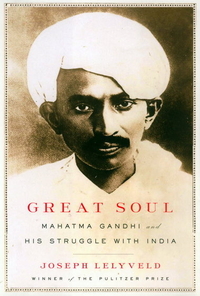Mohandas and the Unicorn
Mini Teaser: Gandhi cuts a saintly figure in the modern imagination. Joseph Lelyveld’s controversial biographical account presents a more dispassionate perspective of the Father of the Indian Nation. An exaggerated creation myth is revealed.
The Egyptian writer Alaa al-Aswany commented in an essay that:
If Gordon Brown ruled Britain by fraud and by emergency law, he would not have apologized to Gillian Duffy. In fact he would probably have had her arrested and sent to the nearest State Security office, where she would have been beaten, strung up by her legs, and electrocuted in sensitive parts of her body. Maybe Duffy would be tried in a State Security emergency court on charges of causing trouble, insulting a symbol of the state, and endangering social peace in Britain.
His point was that any response to political events is conditioned wholly by circumstance. We can see this now in the unfurling events in west Asia: the initially successful protests in Egypt, the civil war in Libya, the killings in Bahrain. In each case, the protests carried out by those who wish to see change are a mortally dangerous gamble—literally a matter of life or death. If you judge the government correctly, mass protests may overwhelm the state. The security forces may switch sides and join the crowd. Perhaps a few hundred people will be killed, but you will have changed history in your country—and overthrown a tyrant. If you judge it wrongly, protesters may end up being killed in very large numbers, and your children or your parents may be rounded up and killed too, or taken to prison to be tortured. In the terrible balance between inertia and protest, between acceptance and revolution, Gandhi’s legacy is central to the decisions that are now being made. The idea of sit-ins, occupying public spaces, peaceful marches, refusing to be moved, and facing down guns with slogans and flags stems from the methods he created. No single figure in the last two hundred years has done more to create a transferable idiom of protest.
Pullquote: Gandhi was not, contrary to later reworkings of his story, a liberal: he liked to lay down rules, was often undemocratic and his ideas were in certain respects traditionally Hindu.Image: Essay Types: Book Review
Essay Types: Book Review 